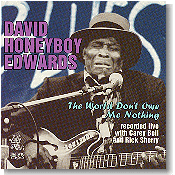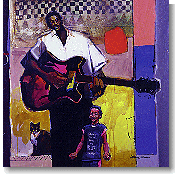 
 








 
|

 One of the
hottest new voices on the blues scene is the Bay Area's Sistah Monica.
While friends had been raving about her to me for several years, I still wasn't prepared
for the power of this young woman's vocals on her new album entitled Sista Monica
(Mo Muscle Records). This is a good solid collection mostly original tunes, in a style
described by one music writer as "... chest thumping onslaught of gospel funk and
groovy blues ..." Sista Monica is at her best on an utterly stunning a capella medley
of "Amazing Grace / Motherless Child." Say amen, somebody! One of the
hottest new voices on the blues scene is the Bay Area's Sistah Monica.
While friends had been raving about her to me for several years, I still wasn't prepared
for the power of this young woman's vocals on her new album entitled Sista Monica
(Mo Muscle Records). This is a good solid collection mostly original tunes, in a style
described by one music writer as "... chest thumping onslaught of gospel funk and
groovy blues ..." Sista Monica is at her best on an utterly stunning a capella medley
of "Amazing Grace / Motherless Child." Say amen, somebody!
Longtime fans of Maria Muldaur will want to pick up her
latest CD, Southland of the Heart (Telarc). But those looking for a bluesier
sound should look elsewhere. This disc is not as spirited as her Black Top releases from a
few years ago. The CD jacket shows her relaxing in a rocking chair on a big, old-fashioned
porch, and the music here has that same laid-back feel. "If I Were You" is a
catchy tune with a bit of a blues sound, and "Blues Gives A Lesson" is a slow
snaky blues.
 With
the number of great blues artists that we've lost in the last 12 months, it becomes more
important to treasure the few pioneers still living. David Honeyboy Edwards
is one of the few remaining links to Robert Johnson, having been playing the blues since
1932. The recordings on The World Don't Owe Me Nothing (Earwig) were done last
year, most cut at the original site of the Leland Hotel in Aurora, Illinois. It was at the
Leland that artists like Tampa Red, Big Joe Williams, Robert Nighthawk, and others made
their earliest recordings for the Bluebird label. Always a very diverse artist, Edwards
mixes Delta classics like "Walkin' Blues," "Catfish Blues" and
"Crossroads" with relatively more recent tunes like "Hide Away." As an
added bonus, there are also several stories told during the session by Edwards. It's also
notable that harmonica player Carey Bell accompanies Edwards on seven of the songs. With
the number of great blues artists that we've lost in the last 12 months, it becomes more
important to treasure the few pioneers still living. David Honeyboy Edwards
is one of the few remaining links to Robert Johnson, having been playing the blues since
1932. The recordings on The World Don't Owe Me Nothing (Earwig) were done last
year, most cut at the original site of the Leland Hotel in Aurora, Illinois. It was at the
Leland that artists like Tampa Red, Big Joe Williams, Robert Nighthawk, and others made
their earliest recordings for the Bluebird label. Always a very diverse artist, Edwards
mixes Delta classics like "Walkin' Blues," "Catfish Blues" and
"Crossroads" with relatively more recent tunes like "Hide Away." As an
added bonus, there are also several stories told during the session by Edwards. It's also
notable that harmonica player Carey Bell accompanies Edwards on seven of the songs.
Smokey Wilson is no longer the unknown artist that he was
in 1986 when Black Magic Records originally released this untitled album. Three excellent
albums on Bullseye Blues and appearances at most major festivals have introduced him to
scores of blues fans around the world. Wilson was backed here by The William Clarke Band
on 11 very good numbers. This is rough and raw blues at its best, a veteran performer
backed by some of L.A.'s best young musicians.
The Radio Kings pulled together a great collection of
vintage photos of the rural South for the jacket of their new CD, Money Road
(Bullseye Blues & Jazz). The music inside is quite fine, too, as band kicks out some
hot roots rock, blues and R&B. Frontman Brian Templeton is a good, nasally singer, at
his best on the soulful "Leave a Light On." He also plays nice harp on the slow
blues "The Shelf."
Otis Clay has always been near the top of my list of
favorite soul and blues singers, and This Time Around (Bullseye Blues) further
cements his reputation is one of the finest crooners around. This is a real "feel
good" album, especially on the catchy "I Can Handle It." Clay's vocals are
strongest on the highly charged "That's How It Is." Another great release from a
guy who deserves much more acclaim than he's received in his career. If only we Americans
appreciated him as much as his Japanese fans.
 With all due respect to Bobby McFerrin, I like the title of this fine
compilation better than his hit song of a few years ago. Don't Worry, Sing The Blues
collects 17 songs originally released on various albums from the Minneapolis-based Atomic
Theory Records. This is a very cohesive collection, highlighted by veteran Minnesota blues
bands Lamont Cranston and their offspring The Hoopsnakes. The former contributes a real,
high octane blues in "Play The Blues," while the latter does a fun novelty tune
in "The First Man (Who Ever Had The Blues)." Among the other artists represented
here are Jimmy Rogers, James Solberg, Willie Murphy, Lynwood Slim, and Al Rapone. With all due respect to Bobby McFerrin, I like the title of this fine
compilation better than his hit song of a few years ago. Don't Worry, Sing The Blues
collects 17 songs originally released on various albums from the Minneapolis-based Atomic
Theory Records. This is a very cohesive collection, highlighted by veteran Minnesota blues
bands Lamont Cranston and their offspring The Hoopsnakes. The former contributes a real,
high octane blues in "Play The Blues," while the latter does a fun novelty tune
in "The First Man (Who Ever Had The Blues)." Among the other artists represented
here are Jimmy Rogers, James Solberg, Willie Murphy, Lynwood Slim, and Al Rapone.
The above compilation also contains one cut from The Butanes Soul
Revue. If you like that song, then you'll want to pick up One Night
(Atomic Theory), captured live in 1990 when Minneapolis band The Butanes added a bigger
horn section and a few extra singers for a rousing night of classic soul. I can never have
too many versions of O.V. Wright's "A Nickel And A Nail," and this band does
well by this soul chestnut, with strong singing from their female vocalists. But the pick
of the litter here is the red hot slow, soulful, gospel-influenced blues "Without
You."
I'm on record as being a big fan of gospel greats The Blind Boys of
Alabama. But this CD moves over one state for a similarly-named group, The
Original Five Blind Boys of Mississippi. In Concert (MUSA) was recorded
at a series of concerts in Germany in 1996. Somehow these recordings don't catch the spark
that I'm sure the live shows contained, at least not until the last few numbers. The group
does a strong version of "If I Had A Hammer," then really gets the spirit on the
closing 14 1/2 minute song "Oh Lord, You Done What The Doctor Could Not Do."
Still, this is good harmonizing gospel music, and I recommend the disc for fans of that
style.
To hear a style of blues that has on the most part faded away, check out
the reissue of Hammie Nixon's Tappin' That Thing (High Water /
HMG). The late Mr. Nixon, who was best known as Sleepy John Estes' partner for many years,
was recorded in Memphis on several occasions from 1982 to 1984. In addition to singing, he
plays harmonica, kazoo and the jug. The title cut, which I played frequently during my
days as a radio host, is a free spirited romp recalling picnics and country frolics from
many years ago.
Goin' To Brownsville (Testament / HMG) contains 21 recordings
from Sleepy John Estes from 1962, followed by a priceless 18-minute
interview with the blues legend done by Pete Welding. Estes is in fine form on remakes of
some of his classic songs like "Divin' Duck" and "Sloppy Drunk Blues."
Equally essential is another Testament reissue, Levee Camp Blues,
from Mississippi singer/guitarist Fred McDowell. The concept is similar
to that of the Estes album, in that McDowell in 1968 reprised some of his classic deep,
ethereal blues songs. The best here is the brooding gospel number "When I Lay My
Burden Down."
Two old pals from my days in North Carolina have each just released new
CDs for the Chapel Hill-based New Moon Music. Danny Morris, who spent a
few years as the guitarist with Washington, D.C.'s The Nighthawks, is out with a very
musically diverse album Storm Surge. Morris has adapted a kind of "Otis Rush
meets Dick Dale" sound, merging straight blues with surf rock. The title cut is a
strong West Side Chicago blues, on which his prodigious guitar talent really shows
through. He also does a nice version of Jimmy Rogers' "That's Alright," while
the Albert Collins influence comes out on the original "Swing With You Baby."
The best surf tune is the instrumental "Moon Relay." Armand Lenchek
has played behind North Carolina veterans like the late Walter "Lightnin' Bug"
Rhodes and Skeeter Brandon. With his band Bluesology, he's now released a tasty collection
of tunes entitled Everything I Need. Lencheck is a smoother player than Morris,
dabbling more in jazz styles. The best cut here is the slow blues original "Cold,
Cold World." "Armand's Attitude" is a nice jazzy instrumental.
Peachfish Stew from Swamp Mama Johnson came in a
few months ago, but somehow slipped to the bottom of my pile. Even though its no longer a
brand new release, I felt that it's worthy of mention. This all-woman band from Washington
state is highlighted by the strong vocals of Lisa Mills, whose voice is somewhat
reminiscent of that of Tracy Nelson. Tracy Ferrara plays some mean sax on a cover of
"Pucker Up Buttercup," and the band shows they can get real funky on the
original "Addiction."
--- Bill Mitchell
While all but one of the 12 songs on Hot Shot (Wild Dog Blues) by Little
Mike and the Tornadoes were written by New Yorker Michael "Little Mike"
Markowitz, they are very much in a 1960s Chicago vein. He says that the album "was
influenced by, and recorded in the style of, my most favorite blues recordings by James
Cotton, Otis Spann, Paul Butterfield, Jimmy Rogers, Jimmy Reed and Muddy Waters."
He's done a good job. Little Mike's harp playing (as well as his vocals and work on piano)
and the guitar work of Troy Chandler evoke those blues greats. "Trying To Make
It" is an uptempo number that showcases Chandler, while "I Won't Be Your
Fool" conjures up the memory of James Cotton's frenetic harp style, with some equally
hot guitar riffs. "True Love" has an added treat --- Mitch Margold's work on the
Hammond B-3.
--- Mark Miller
|

